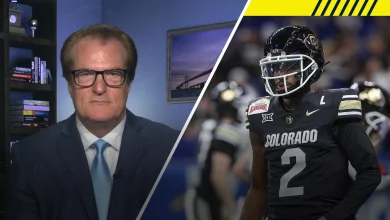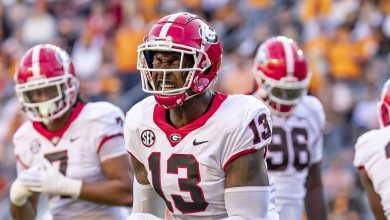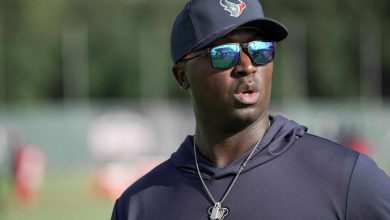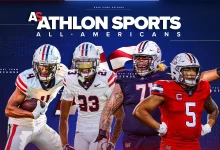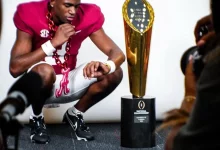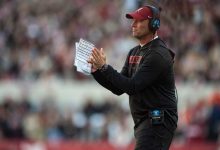David Pollack Calls Jackson Cantwell’s $2M Miami Commitment a “Business Decision” Amid Growing College Football Landscape.
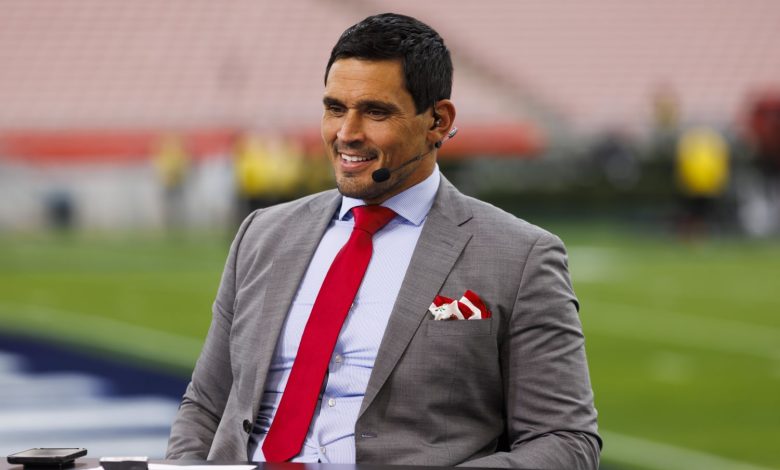
In the world of college football, recruiting has evolved far beyond the traditional process of evaluating talent on the field. Today, financial incentives, NIL (Name, Image, and Likeness) deals, and the professional prospects they provide have become an essential part of the conversation for recruits, coaches, and even alumni. With the changing landscape of college football, top prospects like Jackson Cantwell are now making decisions that may reflect not only their athletic goals but also their future financial well-being.
Recently, ESPN’s David Pollack weighed in on Cantwell’s decision to commit to the University of Miami with a reported $2 million NIL deal. In his comments, Pollack referred to the commitment as a “business decision,” pointing out how the dynamics of college football recruiting have shifted, making it harder to separate the business aspects from the sport itself. His words highlight the broader implications of NIL in today’s recruiting environment, as the pressure on recruits to balance their athletic futures with potential financial gains becomes ever more apparent.
The Impact of NIL on College Football Recruiting
Before diving into Pollack’s statement, it’s essential to understand the transformative impact NIL has had on college football recruiting. In the past, the primary motivator for athletes choosing a college program was the chance to compete at a high level, develop their skills, and eventually enter the professional ranks. However, since the NIL legislation was passed in 2021, athletes have been allowed to profit from their name, image, and likeness, creating an entirely new layer of complexity in recruiting.
For players like Jackson Cantwell, NIL deals are no longer a bonus but often an integral factor in their decision-making process. While elite football players have always had options, NIL now allows them to consider opportunities that were previously unavailable. With schools such as Miami aggressively pursuing top talent through NIL deals, Cantwell’s decision to commit to the Hurricanes is a prime example of how college athletes now have to weigh financial compensation as part of their recruitment.
While some might argue that this could be detrimental to the traditional values of college sports, others believe it opens the door to fairer compensation for athletes whose marketability was previously untapped. In this context, Cantwell’s $2 million commitment to Miami may be seen less as a sign of materialism and more as a necessary step toward securing his future.
Jackson Cantwell’s Commitment to Miami: A Business Decision?
Jackson Cantwell, a highly-rated prospect in the world of college football, has committed to Miami, and the deal includes a reported $2 million in NIL compensation. This commitment has sent ripples throughout the college football world, with analysts, former players, and experts weighing in on the significance of the move. One notable voice among them is ESPN’s David Pollack, who has become one of the most outspoken commentators on the evolving landscape of college football recruiting.
Pollack, a former All-American defensive lineman for the University of Georgia, has been vocal about the shift in college athletics caused by the NIL era. When asked about Cantwell’s decision to commit to Miami, Pollack didn’t shy away from calling it a “business decision.” According to Pollack, athletes today, especially those with the talent and potential of a player like Cantwell, are increasingly aware of the financial opportunities available to them through NIL deals. In his view, the decision to commit to a program like Miami—where the potential for high-profile sponsorships and deals is apparent—becomes more about securing long-term financial stability than simply playing football for a school.
Pollack also pointed out that as more and more schools offer lucrative NIL packages to top recruits, the nature of college football recruitment has shifted from a purely athletic pursuit to one that involves tangible financial rewards. “For a player like Cantwell, this is no longer just about playing for a team,” Pollack said. “This is about setting up his future and securing a financial base that could carry him through his career, whether that’s in football or beyond.”
Pollack’s comment suggests that college football recruiting is no longer just about championships, prestige, or legacy but is increasingly being shaped by financial incentives that can provide immediate benefits for athletes and their families.
Miami’s Aggressive Approach to NIL
Miami has been at the forefront of embracing NIL as a crucial part of its recruiting strategy. Under head coach Mario Cristobal, the Hurricanes have committed to providing significant financial opportunities for recruits who decide to commit to the program. In Cantwell’s case, the $2 million NIL deal serves as an example of how serious Miami is about attracting top-tier talent and competing at the highest level.
The $2 million figure associated with Cantwell’s commitment places him in a class of recruits who are receiving highly lucrative offers to play college football. While NIL compensation varies across schools, Miami’s aggressive approach to NIL has made it one of the top schools in terms of recruiting with financial backing. For Cantwell, the offer represents a tremendous financial opportunity, but it also highlights Miami’s willingness to go above and beyond in its pursuit of talent.
Cantwell’s commitment is part of a larger trend where some of the most successful programs are not just selling their traditions or histories but also their financial capabilities. This new era of recruiting means schools must become highly competitive not only on the field but also in the marketplace of NIL deals.
The Rise of “Business Decisions” in College Sports
Pollack’s characterization of Cantwell’s commitment as a “business decision” is not isolated. In fact, it may become a more common phrase as NIL continues to shape the future of college sports. For recruits, the allure of high-paying endorsement deals, partnerships, and other financial opportunities can be as compelling as the chance to play for a prestigious program or win championships.
While many college athletes still prioritize their athletic development and the opportunity to play at the next level, the financial aspect of the decision is increasingly influential. For top recruits, the opportunity to sign a multi-million-dollar NIL deal while in college is a rare and potentially life-changing event. For some, it may even make more sense to take the best financial offer available rather than taking the traditional route of attending a program that may offer less compensation.
This shift is especially significant for athletes who may not have professional football prospects that guarantee long-term financial stability. NIL provides a way for them to capitalize on their talent and popularity, even if they don’t make it to the NFL.
The Fallout: Is College Football Losing Its Way?
While some view NIL as a welcome modernization of college football, others are concerned that it could erode the purity of the sport. Critics argue that NIL’s growing role in recruitment is turning college athletics into a professionalized marketplace, where the highest bidder wins recruits rather than the program with the best tradition or the most competitive team.
For many, the idea that college athletes are now making “business decisions” rather than decisions based on passion or loyalty to a school may be troubling. The increased commercialization of college football can also make it harder for smaller programs to compete with powerhouse schools that have larger financial backing for NIL deals.
Despite these concerns, the reality is that NIL deals are here to stay, and college football will likely continue to adapt to this new landscape. Athletes like Cantwell, who are able to capitalize on their marketability, are taking advantage of an opportunity that previous generations of players never had.
A New Era in College Football
David Pollack’s comments about Jackson Cantwell’s $2M NIL deal represent a larger shift in the way college football recruits make their decisions. For athletes, especially those with the potential to become stars, the opportunity to secure financial backing through NIL deals has become an integral part of the recruiting process.
As college football continues to evolve, the distinction between sports and business will become more blurred. What’s clear is that NIL deals have forever changed the recruiting landscape, making college football a far more competitive and financially complex environment. Whether that’s good or bad for the sport depends on one’s perspective, but for recruits like Jackson Cantwell, it’s an opportunity that can’t be ignored.
Pollack’s statement that Cantwell’s commitment was a “business decision” is indicative of the new reality college football finds itself in—a reality where both athletic potential and financial opportunity are equally important. For Jackson Cantwell, his decision to commit to Miami was likely the right choice for his future, both on and off the field. And as college football evolves, more players will likely follow suit, blending business with sports as they chart their own paths to success.




